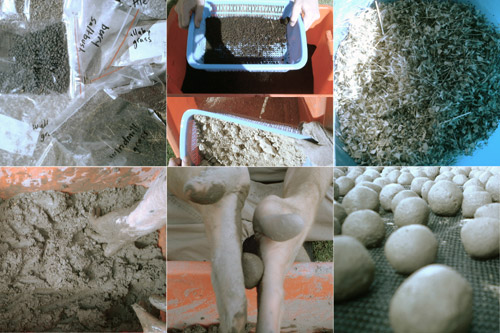Table of Contents
groWorld adl04
as part of Project groWorld
groWorld in adelaide (.au) consisted of:
- a graphical representation of the project on the 'art in the biotech-era' exhibition at the Experimental Arts Foundation
- a talk/visual performance at the 'art in the biotech-era' symposium at the Mercury cinema
- participation in the Symbiotica Workshop
- a gathering session
groWorld gathering (alkan chipperfield, nik gaffney, maja kuzmanovic)
although coming together slower than we originally expected, this gathering session does slowly begin taking shape. in the first weeks we mainly gathered information about the local enivironmental, cultural and botanical conditions, after which we scouted for appropriate sites starting from the suburban areas and moving closer to the centre of the city. we mapped out the sites and proceded to gather specific information about the most appropriate cultivation methods and native plants that could form the beginning of our distributed gardens. simultaneously, we discussed their virtual extensions and connections to other gardens (in other parts of the world). We will conclude this session with spreading seedballs on several sites, documenting the process and leaving it up to nature to do its work for a while. alkan, who is local to adelaide, at least for another year will keep track and document the changes until our next session, which would include 'planting' sensorial apparatus into the gardens and linking them to their computational extensions.
In the following paragraphs, a summary of our activities in march 2004
eco-gathering
- sites
- urban and suburban deactivated zones: weedy patches in between buildings, on empty lots, unused warehouses…
- remote (semi)cultivated zones: patches of cultivaton amidst natural environments (gardens in the middle of a forest, overgrown cultural ruins…)
- community gardens: corner parks, roof-tops, communal terraces…
- living material: indigenous plant-life (seeds), plant compost, clay / soil )
- this material is used to make seedballs ( http://www.seedballs.com )
To conclude this phase, we spread the seedballs on different sites. It will take several months before any progress will be seen, and up to 3 years to grow the 'natural garden' to its full potential.
The sites can be recognised by the foam stickers 'planted' in the vicinity of the gardens. Alkan will periodically document the 'evolution' of the gardens and if possibly exterminate the threats
info-gathering
- information about the local environmental and cultural conditions: in local websites, newspapers, magazines, books, through informal interviews with local people (mainly permaculture and organic gardening experts)
- information about native plants: botanic gardens, botanical journals and books
- maps: topographical, photographic, psychogeographic
- photographic material: sites, plant-life, seed-ball making and spreading…
The next phase of the work will involve the design and implementation of the data-ecologies, based on the information collected locally in Adelaide.


